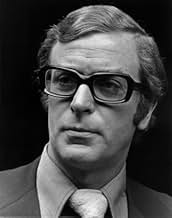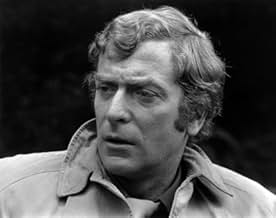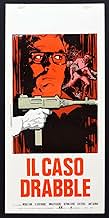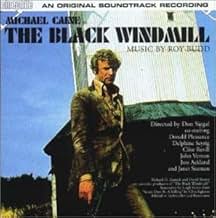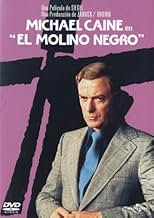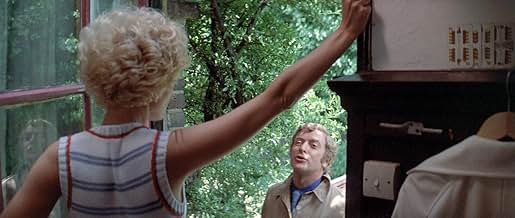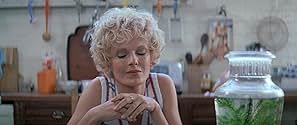AVALIAÇÃO DA IMDb
6,3/10
3,6 mil
SUA AVALIAÇÃO
Adicionar um enredo no seu idiomaA British agent's son is kidnapped and held for ransom.A British agent's son is kidnapped and held for ransom.A British agent's son is kidnapped and held for ransom.
- Direção
- Roteiristas
- Artistas
- Direção
- Roteiristas
- Elenco e equipe completos
- Produção, bilheteria e muito mais no IMDbPro
Avaliações em destaque
I caught this film when it was shown on British television recently and was surprised that I had never previously heard of it, despite the fact that it stars an actor as iconic as Michael Caine and was made by a director as famous as Don Siegel. The "black windmill" of the title is one of the two Clayton Windmills (known locally as "Jack and Jill") on the South Downs near Brighton; this windmill plays an important part in the plot.
As in "The Ipcress File", Caine plays a British secret service agent, but his character here, John Tarrant, is very different to Harry Palmer. Whereas Palmer was a working-class outsider, a former Army sergeant who was virtually blackmailed into joining the secret service to avoid a criminal charge, Tarrant is an establishment insider, part of the officer class. (He holds the rank of Major). He is engaged in an undercover operation to counter the activities of a gang of arms smugglers selling weapons to terrorists in Northern Ireland. (The film was made in 1974 when the Northern Irish troubles were at their height).
The film starts with Tarrant's young son David being kidnapped and held to ransom. The kidnappers appear to have a detailed knowledge not only of Tarrant's family circumstances but also of the work he is engaged on; as their ransom they demand a valuable quantity of uncut diamonds which he has recently acquired to fund his intelligence work. Tarrant initially believes that the kidnappers are connected either to the arms dealers or to the terrorists for whom they are working, and confides in his superior, Cedric Harper. As matters progress, however, he begins to wonder whether matters are really as they seem and whether he can really trust his colleagues.
This is far from being Caine's worst film. (For an actor of his distinction he made more than his fair share of dreadful ones, "Blame It on Rio" and "Ashanti" being two that come to mind). It does, however, highlight one of his weaknesses as an actor, namely that in the early part of his career he was not very good at conveying strong emotions. Most of his iconic roles, at least from this period, involved him playing characters who, for one reason or another, avoid showing much emotion. This could be because they need to keep up the "stiff upper lip" (his characters in "Zulu" and "Battle of Britain"), because they hide their feelings beneath a mask of impassivity (Jack Carter), because they deliberately avoid emotional commitment (Alfie Elkins) or because they try and distance themselves from their feelings through cynicism and irony (Frank in "Educating Rita"). Certainly, some of his more mature performances do show greater emotional depth, such as "The Honorary Consul" and "The Quiet American", but in "The Black Windmill" he is rather wooden, never suggesting the anguish and anxiety of a man whose son is being held for ransom.
Some of the acting is better; Janet Suzman as Tarrant's estranged wife Alex provides the emotional conviction that Caine's performance lacks, while Donald Pleasence is very effective as the smooth but unsympathetic and possibly duplicitous Harper. The film as a whole is a professionally made thriller, if not a very original one, but an essentially American director like Siegel was not the most natural choice to direct a British spy thriller like this one. "The Black Windmill" is never going to rank on his filmography as highly as the likes of "Dirty Harry" and "The Shootist". 6/10
As in "The Ipcress File", Caine plays a British secret service agent, but his character here, John Tarrant, is very different to Harry Palmer. Whereas Palmer was a working-class outsider, a former Army sergeant who was virtually blackmailed into joining the secret service to avoid a criminal charge, Tarrant is an establishment insider, part of the officer class. (He holds the rank of Major). He is engaged in an undercover operation to counter the activities of a gang of arms smugglers selling weapons to terrorists in Northern Ireland. (The film was made in 1974 when the Northern Irish troubles were at their height).
The film starts with Tarrant's young son David being kidnapped and held to ransom. The kidnappers appear to have a detailed knowledge not only of Tarrant's family circumstances but also of the work he is engaged on; as their ransom they demand a valuable quantity of uncut diamonds which he has recently acquired to fund his intelligence work. Tarrant initially believes that the kidnappers are connected either to the arms dealers or to the terrorists for whom they are working, and confides in his superior, Cedric Harper. As matters progress, however, he begins to wonder whether matters are really as they seem and whether he can really trust his colleagues.
This is far from being Caine's worst film. (For an actor of his distinction he made more than his fair share of dreadful ones, "Blame It on Rio" and "Ashanti" being two that come to mind). It does, however, highlight one of his weaknesses as an actor, namely that in the early part of his career he was not very good at conveying strong emotions. Most of his iconic roles, at least from this period, involved him playing characters who, for one reason or another, avoid showing much emotion. This could be because they need to keep up the "stiff upper lip" (his characters in "Zulu" and "Battle of Britain"), because they hide their feelings beneath a mask of impassivity (Jack Carter), because they deliberately avoid emotional commitment (Alfie Elkins) or because they try and distance themselves from their feelings through cynicism and irony (Frank in "Educating Rita"). Certainly, some of his more mature performances do show greater emotional depth, such as "The Honorary Consul" and "The Quiet American", but in "The Black Windmill" he is rather wooden, never suggesting the anguish and anxiety of a man whose son is being held for ransom.
Some of the acting is better; Janet Suzman as Tarrant's estranged wife Alex provides the emotional conviction that Caine's performance lacks, while Donald Pleasence is very effective as the smooth but unsympathetic and possibly duplicitous Harper. The film as a whole is a professionally made thriller, if not a very original one, but an essentially American director like Siegel was not the most natural choice to direct a British spy thriller like this one. "The Black Windmill" is never going to rank on his filmography as highly as the likes of "Dirty Harry" and "The Shootist". 6/10
I just bought and watched the new blu ray of this,and greatly enjoyed it.
I have seen this film before but only on late at night on tv when I was half asleep and the commercials and the pan and scan ruined it for me.
When I concentrated on watching it on wide screen and with interruptions it seems a much better film than its weak reputation.
Perhaps viewers expected more action from the director of Dirty Harry.
The action in the film is fine but it is smarter than just an action film.
So if you are spy or Caine fan or just like good acting seek this film out.
The film has lots of good actors in small parts and the script is good.
But the viewer has to stay alert to enjoy the film.
Now somebody tell me why the same director's Telefon is not on blu ray.
I have seen this film before but only on late at night on tv when I was half asleep and the commercials and the pan and scan ruined it for me.
When I concentrated on watching it on wide screen and with interruptions it seems a much better film than its weak reputation.
Perhaps viewers expected more action from the director of Dirty Harry.
The action in the film is fine but it is smarter than just an action film.
So if you are spy or Caine fan or just like good acting seek this film out.
The film has lots of good actors in small parts and the script is good.
But the viewer has to stay alert to enjoy the film.
Now somebody tell me why the same director's Telefon is not on blu ray.
For this work, scenes of "action", a Don Siegel specialty, are less significant than those that generate characterization and plot, functioning to release tension rather than keep it at bay, although the director's customary taut pacing and stoniness are here, within a twisty story largely faithful to its source, a Clive Egleton novel: "Seven Days to a Killing", strongly scripted by Leigh Vance to further define the character-focused film. A cleverly fresh storyline involves a kidnapping, the victim being son of MI-5 operative John Tarrant (Michael Caine), with a ransom demand for greater than one half million pounds worth of uncut diamonds that are resting within a Defence Ministry safe, as an unknown traitorous official has informed the abductors, with subsequent dual scenario devices of Tarrant's struggle to retrieve his son held by illicit arms syndicate villains, along with Ministry efforts to culpably link Tarrant with the conspiracy. The film benefits from attention to continuity, no loose ends rupturing one's concentration, with heed to detail perhaps its primary strength, yet telling contributions come from many, including players Caine, who adds a needed element of engagement to his Harry Palmer persona, Delphine Seyrig giving a splendidly nuanced performance as companion of the principal evildoer (played with effectual guile by John Vernon), and Donald Pleasence earning the acting laurels here as a dispassionate MI-5 security chief, along with Clive Revill, Joss Ackland, and ever intense Janet Suzman.
Siegel's hand is apparent in the spare deployment of music, with scoring and silence each appropriately employed; palette and filter for well-composed cinematography and montage (shooting is in London, Paris and the Sussex countryside); a symbolic use of clothing colours; and accomplished post-production efforts, all increasing the worth of a piece undervalued by some reviewers, indeed by Caine himself, unfortunate in the event as the film is one of Siegel's finest, his skill with improvisation mating well with capable workmanship.
Siegel's hand is apparent in the spare deployment of music, with scoring and silence each appropriately employed; palette and filter for well-composed cinematography and montage (shooting is in London, Paris and the Sussex countryside); a symbolic use of clothing colours; and accomplished post-production efforts, all increasing the worth of a piece undervalued by some reviewers, indeed by Caine himself, unfortunate in the event as the film is one of Siegel's finest, his skill with improvisation mating well with capable workmanship.
Every now and again you come across a film that's somewhat a letdown, even when those expectations are kept at bay. Don Siegel's mid-70s espionage-thriller 'The Black Windmill' that starred Michael Caine falls in that category. If anything it was that title (which the story is adapted off Clive Egleton's novel "Seven Days to a Killing") which caught my eye. Siegel's adapt, controlled workhorse direction tackles the subdued material with little suspense, but constructing something tight, sullen and dry with the main focus on building something out of its elaborately knotty (but dubious) premise. It's a true pot-boiler entangled with twists. While the material is stimulating (with some good work by the solid support performances and an occasionally witty line) and the sturdy set-pieces are competently crafted, however the pacing is too blotchy and in the end it builds to really nothing. It loses some weight due to the lack of suspense and urgency with a crackerjack climax that's just too quick. Michael Caine's composed performance is strongly delivered, and John Vernon makes for an ideally icy and conniving villain. Donald Pleasance is delightfully squirmy (which his character likes to really fiddle with that moustache) and Janet Suzman provides some fire. Delphine Seyrig and Clive Revill offer able support too. Roy Budd's sizzling, but low-key music score works well and Ousama Rawi lenses it with a great illustrative eye. Siegel's touch is evident in both of those devices. An unexceptional feature, but still its well organised and performed.
Like a forerunner of Taken crossed with a '60s espionage movie (Harry Palmer with a dash of Bond), The Black Windmill stars Michael Caine as Major John Tarrant, an MI6 agent whose son is kidnapped and held for ransom. When his superiors refuse to part with the asking price - half a million in uncut diamonds - Tarrant goes rogue, stealing the stones to make the payoff.
Even though the plot for this thriller isn't quite water-tight, the assured direction from Don Siegel (Dirty Harry) and strong performances from a great cast (which includes Donald Pleasence, John Vernon, Clive Revill and Joss Ackland) ensure that the film is an entertaining ride, with some well staged action sequences and plenty of intrigue.
Fans of star Caine will not be disappointed - he puts in a fine performance as the calm, collected spy pushed to take matters into his own hands - whilst Vernon makes for a suitably cruel foe. Both actors meet for a mid-movie engagement in which Tarrant test-runs a very Bond-esque briefcase armed with a rocket, and again for a satisfying shootout in the titular structure.
While not a 'classic' like Dirty Harry, largely thanks to the awkward questions that arise from the twisty plot and uneven pacing, there is still plenty to enjoy here for fans of the genre.
6.5/10, rounded up to 7 for IMDb.
Even though the plot for this thriller isn't quite water-tight, the assured direction from Don Siegel (Dirty Harry) and strong performances from a great cast (which includes Donald Pleasence, John Vernon, Clive Revill and Joss Ackland) ensure that the film is an entertaining ride, with some well staged action sequences and plenty of intrigue.
Fans of star Caine will not be disappointed - he puts in a fine performance as the calm, collected spy pushed to take matters into his own hands - whilst Vernon makes for a suitably cruel foe. Both actors meet for a mid-movie engagement in which Tarrant test-runs a very Bond-esque briefcase armed with a rocket, and again for a satisfying shootout in the titular structure.
While not a 'classic' like Dirty Harry, largely thanks to the awkward questions that arise from the twisty plot and uneven pacing, there is still plenty to enjoy here for fans of the genre.
6.5/10, rounded up to 7 for IMDb.
Você sabia?
- CuriosidadesDonald Pleasence came up with the idea for his character to constantly use a hankie.
- Erros de gravaçãoIn the roof garden where Tarrant's wife sends the toy fire engine down the slide towards him, as Tarrant turns to re-enter the house, the reflection of the boom mic can briefly be seen in the glass doors behind.
- Citações
Cedric Harper: He knew my name and he knew the name of this department. Both of these things imply serious breaches of security.
- Cenas durante ou pós-créditosThe opening credits are formed from images of children's alphabet blocks.
- ConexõesReferences A Noviça Rebelde (1965)
- Trilhas sonorasUnderneath the Spreading Chestnut Tree
(uncredited)
(trad.)
Principais escolhas
Faça login para avaliar e ver a lista de recomendações personalizadas
- How long is The Black Windmill?Fornecido pela Alexa
Detalhes
Bilheteria
- Orçamento
- US$ 1.500.000 (estimativa)
Contribua para esta página
Sugerir uma alteração ou adicionar conteúdo ausente

Principal brecha
By what name was O Moinho Negro (1974) officially released in India in English?
Responda

